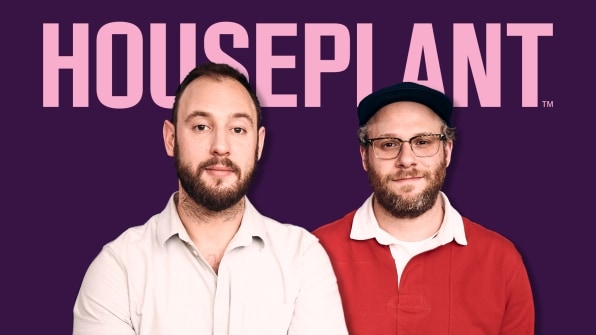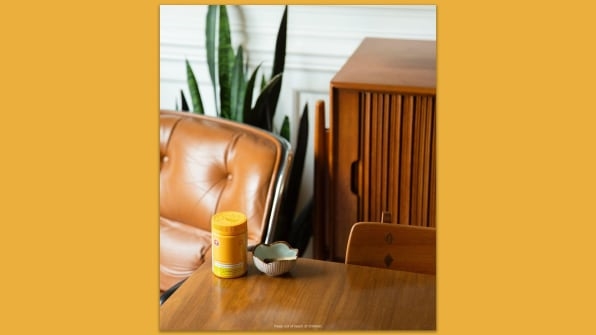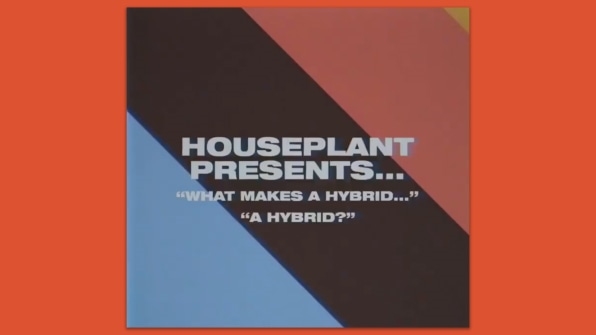Seth Rogen and Evan Goldberg’s weed brand, Houseplant, is ready to light up America
In the 2008 film Pineapple Express, Seth Rogen’s character, Dale, is introduced to a new, innovative, cross-shaped joint-rolling design by his dealer, Saul (James Franco). “This is the future,” says Saul. “This is, like, the apex of the vortex of joint engineering. . . . This is it, man. This is what your grandchildren are gonna be smoking. Future. The future . . .”
Now Rogen and his long-time creative and filmmaking partner Evan Goldberg are taking a step into their own weed-infused future by officially launching their cannabis brand, Houseplant, in the United States. The company’s weed products will initially only be available direct-to-consumer in California, through the brand’s website. However, its House Goods line of products—including tabletop lighters and ashtray designs—may be its secret weapon in brand building.
“House Goods is our path to be able to build a relationship with people nationwide right from the start,” says CEO and co-founder Michael Mohr. “The legal patchwork from state to state and federally makes it very challenging to scale a cannabis business in the U.S. right away.”

[Photo: Houseplant]
Just like its two Hollywood cofounders, Houseplant got its start north of the border, launching in Canada in 2019 as a subsidiary brand of Canopy Growth, with cannabis products that include dried flowers, prerolled joints, soft-gel capsules, and two flavors of carbonated drinks. As of today, out of necessity, the brand is maintaining separate social media for Canada and the United States.
Houseplant has established its bona fides for high-quality weed, yes, but it has also made a name for itself with its retro design sensibility and brand image, winning awards for its packaging and brand design. Matchboxes that look like VHS tape cases. A three-album vinyl collection. Tasteful pics of joints sitting in what appears to be Don Draper’s office.

Both Rogen and Goldberg are closely involved with every aspect of the company, having worked on its development for the past eight years. Their aim for Houseplant is to create a brand that gives the same respect, passion, and attention to detail that they’ve long seen afforded to just about everything else in our homes. “Our strategy has always been the same, and that is to treat cannabis like the product that it is—which is the best product,” says Rogen, via Zoom. “In a world where things like headphones get incredible attention to detail, in terms of how they’re designed, presented, and marketed, we think weed is a thousand times better than headphones. Why is weed not getting that amount of attention?”
Smoking in style
The company’s midcentury sensibility flows through everything from its logo to the lighters. The goal was to create a look and set of products with a design aesthetic that felt new and innovative for the category, but also like something you might find in a stylish antique shop.
“I have a huge collection of mid-century modern ashtrays, furniture, chairs, and things like that,” says Rogen, “and it is a timeless aesthetic. It was a time when people put a lot of time and consideration into smoking, so that’s something I was obviously heavily inspired by. We want to make our products as beautiful and accessible as possible because of a few things: First, people just haven’t put enough attention to detail on things for people who smoke weed. It bucks a lot of stereotypes about people who smoke weed. It’s saying that people who smoke weed can be very detail-oriented, can work hard, can manifest their goals into objects, and it’s acknowledging that people who love weed also like nice things and aren’t just lazy slobs. Weed has lived under your coffee table, in your sock drawer, in the back of your desk for a long time, and it doesn’t deserve that. It belongs with the other things you feel represent your sensibilities.”
Rogen points to the laundry list of accessories and accoutrements associated with alcohol, which are often proudly displayed. “I don’t drink, but I have a bar. I have a martini shaker. I have corkscrews, champagne glasses, all of that,” he says. “It’s because alcohol, which I do not think is a good substance, gets a lot of reverence and has been celebrated. It gets a lot of thought put into the design and lifestyle of those who consume and enjoy it. That same thought hasn’t been put into weed. And we are more than happy to be the ones to be doing that.”
There’s also a distinctly ’80s VHS vibe to the brand’s video content so far.

Goldberg says that while the brand is a direct manifestation of his and Rogen’s own tastes, it also takes a few points from their day job. “We always put our own passion and design into things, but as with our film career, we’re very accustomed to thinking of things from the audience’s perspective,” says Goldberg. “So I hope that will also come through, not just because of our passion but because we really think about who’s going to buy this, what are they going to do with it, and how are they going to use it.”
Privilege and purpose
One thing that Houseplant execs as well as Rogen and Goldberg themselves are quick to point out is their privileged position as a new cannabis brand. Not only because of the celebrity ties but also for having affluent founders who have never felt major legal or social ramifications for openly loving and consuming weed. Part of the brand’s marketing and social platform will continue aiming to educate followers on the dark history of the war on drugs and advocate for ending unjust, racist cannabis laws that still exist.
Houseplant says that it works with criminal-justice and drug-policy-reform nonprofits and social enterprises in both the U.S and Canada to provide funding and in-kind support to several organizations, including Marijuana Policy Project, Cage Free Cannabis, Cannabis Amnesty, and NORML. The company is also establishing a mentorship program that will support underserved entrepreneurs in the cannabis space; details on that will be announced in the coming months.
“We’re very fortunate to be from Vancouver, a place that treated weed the way it did when we were kids, and the whole reason we’ve been so fortunate with this company is because of where we’re from and [being] able to cultivate this life around cannabis that other people haven’t,” says Goldberg. “There’s a responsibility that comes with that.”
Light up
Looking at launch day, the two are as excited as with any film premiere.
“Whenever you’re launching something, it’s exciting but always a little scary,” says Rogen. “Especially with products that genuinely feel new. I don’t know if many people have been manufacturing table lighters in the last six decades or so. It’s something I know I personally would want more than anything, as someone who loses more lighters than anyone I’ve ever met. We just have to hope that our tastes, and the things we want as people who smoke weed, that others agree with that.”
Goldberg says they’ve been working as long and hard on Houseplant as on any of their best film projects. “The difference is that movies come out, and then they go into the history books,” he says. “And this is going to keep happening and evolving.”
WATCH: Jay-Z shines a light on hypocritical cannabis policies while Nike faces a sneaker reselling scandal—brand hit and miss of the week
Fast Company , Read Full Story
(62)



